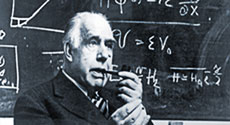Niels Bohr Lecture by Sarang Gopalakrishnan, Princeton University
Title: Learnability transitions
Abstract: How much can one learn about the state of a quantum (or classical) system by measuring it intermittently as it evolves? Surprisingly, the rate of learning undergoes sharp phase transitions as one increases the density of measurements.
In the weak measurement limit, chaotic dynamics effectively hides information from the observer; for strong enough measurements, information is rapidly revealed.
I will describe how learnability transitions are related to quantum error correction thresholds, and how they can be interpreted as an unconventional form of spontaneous symmetry breaking, called "strong-to-weak symmetry breaking," that is intrinsic to open systems.
About the speaker
Sarang Gopalakrishnan is Assistant Professor of Electrical and Computer Engineering at Princeton University and recipient of the NSF CAREER Award in 2017.
He is a theorist working at the interface between quantum statistical mechanics and quantum information theory. He also collaborates with experimentalists in photonics, atomic physics, and condensed matter physics.
His broad research interests encompass the dynamics of quantum systems and devices, and particularly in the dynamics of quantum information, but his work also reaches farther afield, to computer science, data compression, approximation theory, and more.
Coffee, tea and cake will be served outside Aud. 3 at 15:45
 Niels Bohr Lectures er en engelsk-sproget foredragsrække på Niels Bohr Institutet med kendte forskere fra hele verden.
Niels Bohr Lectures er en engelsk-sproget foredragsrække på Niels Bohr Institutet med kendte forskere fra hele verden.
Foredragene holdes cirka 10 gange om året og er offentlige. De er for studerende og ansatte ved Niels Bohr Institutet samt andre med interesse for at høre om videnskabelig forskning i verdensklasse. Foredragene holdes på et ikke-teknisk niveau, hvor de kan forstås af alle med en baggrundsviden, der svarer til de første år på fysikstudiet.
Tidspunkt og sted: Hvis intet andet er anført, finder foredragene sted kl. 15.15 i Margrethe Bohr Salen, Niels Bohr Bygningen, 2200 København N. Kaffe og kage serveres en halv time inden foredraget starter.
The lectures are public and held about 10 times a year. The lectures are for students and staff at the Niels Bohr Institute and others interested in worldwide scientific research. The lectures are held on a non-technical level where they can be understood by anyone with a background similar to the first year of physics study.
Time and place: Unless otherwise specified, the lectures take place at. 15.15 in Margrethe Bohr Salen, Niels Bohr Bygningen, 2200 Copenhagen N. Coffee and cake will be served half an hour before the lecture starts.
